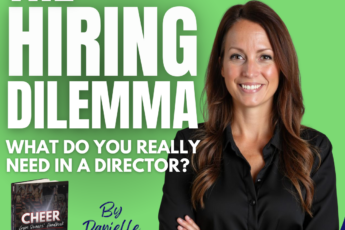A couple days ago I told you how I recognize when I’m about to be very stressed. That stress often leads to a few days of burnout. Fortunately, I’m past the point in my gym owner career where I wonder if it’s all worth it. Thirteen years in, I’ve got enough wisdom to know it’s absolutely worth it. I see what my gym has done for the kids I’ve coached, my own family, and for my staff.
I know all the work pays off—but that doesn’t mean I’ve never sat back and dreamt of being a barista … going home without any extra work to do, turning frowns upside down as cranky people get their caffeine, and reveling in health insurance that doesn’t cost four figures per month. (Uh oh, I’ve probably sold a few of you on putting in a Starbucks application … Don’t do it though!)
When you’re stressed, are you someone who just needs a long vacation, and that holds you over for awhile? Or are you someone who needs to do small, stress-relieving activities daily to prevent burnout?
Quite frankly, I’m both! I am always so impressed when someone can go on a vacation once or twice a year and come back fully refreshed. I refresh, but for about two days. Then I’m back to the hustle.
Even coming back from a vacation can be a source of stress in itself if you’re not prepared for it. So, today, I’ll give you my firsthand experiences of this and how I’ve been able to prevent total burnout shortly after a vacation.
The Vacation Stress Cycle
Last year I spent a total of 71 typical work days away from my gym. I was lucky enough to spend time in Mexico, Las Vegas and Europe, as well as attend conferences for Next Gen. My focus was entirely not on my gym for those few days; however, it took a big toll on me. I’d like to tell you that by my 12th year of owning a gym, I had vacations figured out, but some of those trips were right smack in the middle of the season, so I can’t say that.
Instead, I found myself working 60-hour weeks leading up to the vacations, trying to get everything done ahead of time and ensure no balls would be dropped; then, I found myself following up those vacations with 60-hour weeks. Sandwich your vacations like that on a regular basis, and they won’t be all that relaxing.
On top of that, I like adventure. On one vacation, we hiked to the top of Santorini (if you’ve been there, you know I hiked past the donkeys, and it was quite the experience). On a different trip, we got scuba certified, and on another, we did five-story ropes courses. We enjoy adventure, but adventure is not necessarily relaxing.
I realized I had to set different expectations for these trips than I would if I were going to sit on a beach all day. That said, I also needed to find some solutions to reduce stress before and after vacation. While working hard before a trip was expected, coming home to a 60-hour workweek reversed nearly all the stress that had melted away. Over the course of the year, I also found myself feeling anxious during our vacations in anticipation of the work ahead of me when I returned.
One of our vacations in particular was 17 days long. We cruised on the Mediterranean, traveled through Europe, and had a fair balance of relaxation and adventure. Though I had a trusted team of staff members at home, I knew my inbox wasn’t clearing itself when I returned. I also knew there would be things waiting for me—and boy, was I right. After a vacation of that length, I was easily looking at three weeks of long days playing catch up and working to get back on track.
By the time I was caught up, I was stressed all over again and ready for another vacation. This cycle of rest sandwiched between stress was something I noticed and vowed to fix in 2024. I didn’t quite get it right on our cruise this past spring nor on our weeklong trip to Dallas for the Next Gen conference. But, in July, I went to Mexico for a week, and for the first time in as long as I can remember, I felt like I could return to a “normal” workweek. A month later, and the normal stress still hasn’t crept back in yet.
Breaking the Vacation Stress Cycle in Your Gym
So what did I do in my gym to fix that cycle?
- I was honest with those around me that I wouldn’t be taking on any big projects within a few weeks of my vacation. Additionally, I wouldn’t commit to deadlines within a week of return. Projects had to get done, but someone else would have to take them, or the pushed deadline would have to suffice.
- I did check my email while on vacation, but I had a plan. Any emails that needed more than a sentence or two of response, needed any coordination or further information to answer, or required me to follow up later in any way got forwarded on to others who could handle them quicker and more efficiently than I could while on vacation. I’ve never been an advocate for checking emails all day. Emails are not emergencies, or they’d be phone calls. So, I checked my email once a day. It didn’t interfere with my vacation, and I came home to a clear inbox.
Breaking the Vacation Stress Cycle at Home
I also did a few things in my personal life to ensure I left the stress at home:
- I hired someone to come clean my house the day before we left. Usually she comes earlier in the week, but the last thing I wanted was to clean out my refrigerator and do dishes the night before we left when a thousand other things had to be done. The best part? I came home to a clean house, and it felt fantastic.
- On my phone, I have a checklist of items I take on every vacation to prevent me from buying $18 bottles of sunscreen at a Mexican resort. I don’t always need every single item on my list, but I at least think about it. This time, I looked at my list a week in advance, hopped online, and ordered the majority of the things I needed. Not only did this extra time keep me from running to Walmart at 10 p.m. the night before we left, but it also gave me the week to consider anything I needed to add to the list.
- I blocked off the day before we left and the two days after we returned. I didn’t make appointments, coach or take any client calls those days. I didn’t even attend our staff meeting. Instead, I focused on wrapping up projects before I left and easing back into the swing of things when I returned rather than the mental jolt I had felt on every previous vacation.
If you are like me and you struggle to relax on vacation, try these tips. Tomorrow, I’ll share a few things I do to combat stress on a daily basis. Although you may have gotten used to it, you don’t have to live in a constant state of stress. One day, you won’t be on your deathbed wishing you’d accomplished more in your gym in 2024. Instead, you’ll look back on the experiences you shared with your family and friends and the legacy you left behind. It’s hard to do that if you’re not yourself due to constant stress. As my foreign exchange student said last year, “Live a life you will remember.”
Key Takeaways:
- Recognize stress triggers: Understand your own stress patterns to prevent burnout before it starts.
- Pre-vacation planning: Set realistic expectations and delegate tasks to ensure a smooth return.
- Post-vacation strategies: Block off time to adjust back into your routine without overwhelming yourself.
- Daily stress relief: Incorporate small, consistent stress-relieving activities into your daily routine.
- Work-life balance: Prioritize your mental health and make strategic decisions that benefit both you and your gym in the long run.









